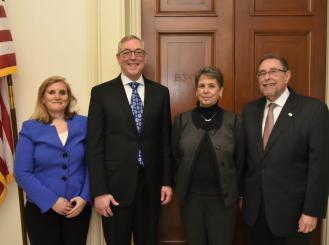Feb 01, 2017
Continuing to recognize the gains made in our understanding of immunotherapy, ASCO has named immunotherapy 2.0 as its cancer advance of the year in Clinical Cancer Advances 2017: ASCO's Annual Report on Progress Against Cancer.
ASCO released the report at a briefing on Capitol Hill, emphasizing federal funding for research as a major driver for progress against cancer. Although Congress recently approved funding increases for the National Institutes of Health (NIH) and National Cancer Institute (NCI) for 2017, annual increases that keep pace with inflation are critical to build on the promising research results highlighted in the report.
“Today, increasing knowledge about both cancer and immunology is leading to more and smarter use of treatments that activate a patient’s own immune system. Federal funding has made these life-saving advances possible and remains essential to increasing the pace of discovery and progress,” said ASCO President Daniel F. Hayes, MD, FACP, FASCO.
Immunotherapy 2.0: Expanding use and refining patient selection
“Immunotherapy 2.0” refers to the next wave of immunotherapy discovery, focused on identifying patients in whom these treatments work best, discovering mechanisms of resistance that can be overcome, and developing better means of reducing toxicities. Over the past year, research showed that checkpoint inhibitors are more effective against certain tumors that have a large number of genetic changes and those that have high levels of the PD-L1 protein.
Advances shaping the future of patient care
A range of other important advances and trends are featured in Clinical Cancer Advances 2017:
- Precision medicine: Last year brought approvals of new treatments targeting molecules important in the growth of certain types of kidney, lung, breast, and blood cancers.
- Liquid biopsies: The first test for circulating plasma tumor DNA was approved by the U.S. Food and Drug Administration in 2016 for certain patients with lung cancer. The test allows oncologists to assess key cancer-driving tumor mutations through a simple blood draw, thereby facilitating selection of optimal treatment and monitoring changes in the status of the tumor over time.
- New tools help bridge gaps between patients and physicians: The report highlights a web-based tool for self-monitoring symptoms that immediately alerts the cancer care team when patients report that a symptom is worsening. In addition, education and patient navigation programs for underserved populations demonstrate ways to increase treatment adherence.
“To conquer cancer, we must conduct research across the cancer care continuum, from screening to new treatments and strategies that help ease treatment side effects,” said Harold J. Burstein, MD, PhD, FASCO, co-executive editor of Clinical Cancer Advances 2017. “I’m excited by the advances we’ve made in just this past year as they will help many patients around the world live longer, healthier lives.”
Progress ignited by national investment in research
This year, almost one in three top advances featured in ASCO’s Clinical Cancer Advances report was made possible by federal grants. Despite recent budget increases, the NIH still has less purchasing power than it did a decade ago. ASCO calls on the new Congress and White House administration to build on its recent investments in cancer research, and provide at least $34.1 billion for the NIH in Fiscal Year 2017.
“Much work still lies ahead. After a decade of flat funding, we are encouraged by the recent increase in NIH support. Sustained federal investment is needed to continue our momentum and build on the progress we’ve achieved. We need to catch up and keep up,” Dr. Hayes said.

